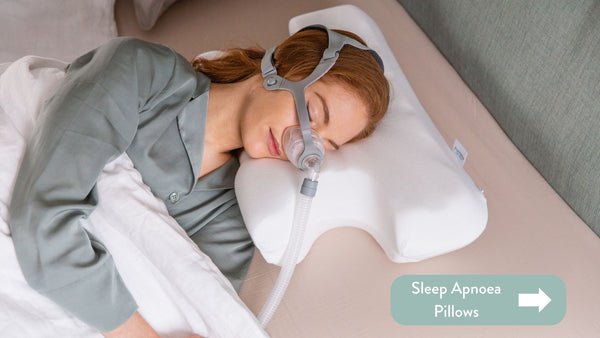
Creating a Comfortable Sleep Environment for COPD Sufferers
Living with Chronic Obstructive Pulmonary Disease (COPD) can be challenging, especially when it comes to getting a good night's sleep. Many COPD sufferers struggle with restless nights and poor sleep quality, which can significantly impact their overall health and well-being. This comprehensive guide aims to help COPD patients, caregivers, and sleep health enthusiasts create a comfortable sleep environment that promotes better rest and improved quality of life.
Understanding the importance of a good night's sleep for those with COPD is crucial. Quality sleep not only helps the body recover and recharge but also plays a vital role in managing COPD symptoms and maintaining overall health. By implementing the strategies and tips outlined in this guide, you can create a sleep sanctuary that addresses the unique needs of COPD patients and supports their journey towards better sleep and improved well-being.
NHS records and forecasts show COPD exacerbations are the second leading cause of emergency hospital admissions, making up 1 in 8 hospital admissions in the UK. The prevalence of COPD is expected to rise by 40%, with the annual cost to the NHS projected to reach £2.5 billion by 2030.
COPD and Sleep: A Complex Relationship
COPD is a progressive lung disease that makes breathing difficult and can significantly impact sleep quality. The relationship between COPD and sleep is complex and multifaceted. Let's have a look at how COPD affects sleep and why creating a comfortable sleep environment is so crucial for those living with this condition.
COPD symptoms, such as chest infections, coughing, wheezing, and shortness of breath, often worsen at night. This can make it challenging for patients to fall asleep and stay asleep throughout the night.
The discomfort and anxiety associated with breathing difficulties can lead to frequent nighttime awakenings and poor sleep quality.
Moreover, COPD can cause a decrease in blood oxygen levels during sleep, a condition known as nocturnal hypoxemia. This can further disrupt sleep patterns and contribute to daytime fatigue and decreased quality of life. By creating a sleep environment that addresses these challenges, COPD patients can improve their sleep quality and overall well-being.
Understanding the COPD-Sleep Connection
COPD is a progressive lung disease that makes breathing difficult, and its impact on sleep quality is significant. Many COPD patients experience sleep disturbances that can exacerbate their symptoms and affect their quality of life.
The relationship between COPD and sleep is complex and multifaceted. COPD can lead to various sleep-related issues, including:
- Nocturnal oxygen desaturation: COPD patients may experience a drop in blood oxygen levels during sleep, which can lead to frequent awakenings and poor sleep quality.
- Sleep apnoea: Some COPD patients also suffer from sleep apnoea, a condition where breathing repeatedly stops and starts during sleep. This combination, known as overlap syndrome, can further complicate sleep patterns.
- Insomnia: The discomfort and anxiety associated with COPD can make it difficult for patients to fall asleep or stay asleep throughout the night.
These sleep disturbances can create a vicious cycle, where poor sleep leads to increased fatigue and worsened COPD symptoms during the day. Therefore, addressing sleep issues is crucial for managing COPD effectively and improving overall quality of life.
Essential Elements for a comfortable COPD sleep environment
Creating a comfortable sleep environment for COPD sufferers involves addressing several key elements. By focusing on these aspects, you can significantly improve sleep quality and reduce nighttime discomfort.
Comfortable sleep COPD essentials can be relatively easy to implement with a little planning.
Air Quality Improvement
One of the most critical factors in creating a comfortable COPD sleep environment is ensuring good air quality. Poor air quality can exacerbate COPD symptoms and make it difficult to breathe comfortably during sleep.
To improve air quality in the bedroom, consider using an air purifier with a HEPA filter. These devices can remove allergens, dust, and other irritants from the air, making it easier for COPD patients to breathe. Regularly changing air filters in your home's heating and cooling systems can also help maintain good air quality.
Additionally, keeping the bedroom free from strong odours and chemical fumes is essential. Avoid using heavily scented cleaning products or air fresheners in the sleep area, as these can irritate the airways and make breathing more difficult for COPD patients. Be aware that spray deodorants can also have the same impact.
"COPD and Pollution/Climate change are related issues. Work on one will help the other."
Bedding and Mattress Selection
Choosing the right bedding and mattress is crucial for creating a comfortable sleep environment for COPD sufferers. The right combination of pillows, mattress, and bedding can help alleviate breathing difficulties and promote better sleep posture.
When selecting pillows for COPD sufferers, look for options that provide adequate support and elevation. Putnams wedge pillows or bed wedges can help elevate the upper body, making it easier to breathe and reducing the risk of acid reflux, which can worsen COPD symptoms.
Organic bedding for COPD patients is another important consideration. Opt for hypoallergenic materials that are free from harsh chemicals and irritants.
Natural fabrics like organic cotton or British wool can be more breathable and comfortable for sensitive skin.
Temperature and Humidity Control
Maintaining the right temperature and humidity levels in the bedroom is essential for COPD patients to sleep comfortably. Extreme temperatures and humidity can make breathing more difficult and exacerbate symptoms.
Aim to keep the bedroom temperature between 60-67°F (15-19°C), which is generally considered ideal for sleep. Use a programmable thermostat to maintain a consistent temperature throughout the night.
Humidity levels are equally important.
Dry air can irritate the airways, while excessive humidity can promote mold growth and worsen breathing difficulties. A humidity level between 30-50% is generally recommended for COPD patients. Consider using a humidifier or dehumidifier to maintain optimal humidity levels in the bedroom.
Lifestyle Changes and Sleep Hygiene Tips for Better Sleep
In addition to creating a comfortable sleep environment, certain lifestyle changes and sleep hygiene practices can significantly improve sleep quality for COPD patients.
Positioning and Breathing Exercises
Proper positioning during sleep can make breathing easier for COPD patients. Sleeping on your side with a pillow between your legs or on your back with your head slightly elevated can help reduce shortness of breath and improve oxygen flow.
Practicing breathing exercises before bed can also help relax the body and prepare for sleep. Techniques such as diaphragmatic breathing or pursed-lip breathing can help improve lung function and reduce anxiety associated with breathing difficulties.
Incorporating these exercises into a nightly routine can help COPD patients feel more relaxed and prepared for sleep, potentially reducing nighttime awakenings and improving overall sleep quality.
Smoking, Weight Management and Exercise
In high-income countries, tobacco smoking is responsible for more than 70% of COPD cases. In low- and middle-income countries (LMICs), tobacco smoking contributes to 30-40% of COPD cases, with household air pollution being a significant risk factor. (World Health Organization, WHO)
Maintaining a healthy weight is crucial for COPD patients, as excess weight can put additional strain on the respiratory system and make breathing more difficult during sleep. A balanced diet and regular exercise can help manage weight and improve overall health.
While exercise may seem challenging for COPD patients, even light physical activity can have significant benefits. Consult with a healthcare provider to develop an appropriate exercise plan that may include activities like walking, swimming, or seated exercises.
Regular physical activity can help improve lung function, increase energy levels, and promote better sleep. However, it's important to avoid vigorous exercise close to bedtime, as this can interfere with sleep onset.
Establishing a Regular Sleep Schedule
Maintaining a consistent sleep schedule is essential for good sleep hygiene. Try to go to bed and wake up at the same time every day, even on weekends. This helps regulate your body's internal clock and can improve sleep quality over time.
Create a relaxing bedtime routine to help signal to your body that it's time to wind down. This might include activities like reading, listening to calming music, or practicing gentle stretches or meditation.
Avoid stimulating activities, bright screens, and heavy meals close to bedtime, as these can interfere with sleep onset. Instead, focus on calming activities that prepare your body and mind for rest.
COPD-Friendly Sleep Aids: Finding the Right Support
In addition to creating an optimal sleep environment, there are various sleep aids and therapies that can benefit COPD patients. Let's explore some of these options:
-
CPAP and BiPAP Therapy
Continuous Positive Airway Pressure (CPAP) and Bilevel Positive Airway Pressure (BiPAP) machines can be incredibly helpful for COPD patients, especially those with sleep apnoea. These devices deliver pressurized air through a mask, helping to keep airways open during sleep.
CPAP machines provide a constant air pressure, while BiPAP machines offer two pressure levels - one for inhalation and a lower one for exhalation. Your healthcare provider can help determine which option is best suited for your needs.
- Oxygen Therapy
Many COPD patients require supplemental oxygen during sleep. Nocturnal oxygen therapy can help maintain proper blood oxygen levels, leading to increased COPD night-time comfort, improved overall sleep quality and daytime functioning.
- Medications and Alternative Therapies
Certain medications can help manage COPD symptoms and improve sleep. However, it's essential to work closely with your healthcare provider to find the right balance, as some COPD medications can interfere with sleep if not timed correctly.
Alternative therapies such as relaxation techniques, meditation, or gentle yoga may also help improve sleep quality for some COPD patients. These practices can reduce anxiety and promote relaxation, making it easier to fall asleep and stay asleep.
Support and Resources for COPD Patients and Caregivers
Managing COPD and improving sleep quality can be challenging, but you don't have to do it alone.
According to NHS data about 1.17 million people in England were diagnosed with COPD in 2020/21, representing roughly 1.9% of the population.
There are numerous resources and support systems available to help COPD patients and their caregivers navigate these challenges.
Community Support Groups
Joining a COPD support group can provide valuable emotional support, practical advice, and a sense of community. These groups offer opportunities to share experiences, learn from others, and stay informed about the latest treatments and management strategies.
Many hospitals and healthcare organizations offer local support groups for COPD patients and caregivers. Additionally, online communities and forums can provide support and information from the comfort of your home.
Participating in these groups can help reduce feelings of isolation, provide motivation for maintaining healthy habits, and offer practical tips for improving sleep and managing COPD symptoms.
Professional Guidance and Advice
Regular check-ups with healthcare providers are essential for managing COPD and addressing sleep-related issues. Doctors, respiratory therapists, and sleep specialists can offer personalized advice and treatment options tailored to your specific needs.
Don't hesitate to discuss sleep problems with your healthcare team. They can help identify potential underlying issues, adjust medications if necessary, and recommend additional strategies for improving sleep quality. Some healthcare providers may also offer home visits or telephone consultations, which can be particularly helpful for assessing your sleep environment and providing specific recommendations for improvement.
Helpful Groups and Organisations
- Asthma + Lung UK
- LIVE WELL WITH COPD
- Living with Chronic Obstructive Pulmonary Disease (COPD)
- Chronic obstructive pulmonary disease (COPD) - Treatment
The Importance of Quality Sleep in COPD Management
Unlock your best sleep yet with our easy 8-step guide. Experience the Putnams difference tonight. #BetterSleepWithPutnams #PutnamsSleepGuide #RestEasy #WakeUpRefreshed #PutnamsSleepTips #findcomfort #putnams pic.twitter.com/Bbx2yt5fth
— Putnams (@PutnamsComfort) January 26, 2024
Creating a comfortable sleep environment for COPD sufferers is not just about getting a good night's rest, it's an essential component of overall disease management and well-being. Quality sleep can help improve daytime energy levels, enhance cognitive function, and boost the immune system, all of which are crucial for COPD patients.
By implementing the strategies outlined in this guide, from improving air quality and selecting appropriate bedding to incorporating helpful technologies and adopting healthy sleep habits, COPD patients can significantly enhance their sleep experience and overall quality of life.
Remember that everyone's needs are unique, and it may take some time to find the perfect combination of strategies that work for you. Be patient with yourself and don't hesitate to seek support from healthcare providers, support groups, and loved ones as you work towards creating your ideal sleep sanctuary.
We encourage you to share your own experiences and tips for creating a comfortable sleep environment with COPD. Your insights could make a world of difference for someone else struggling with similar challenges. Together, we can build a supportive community dedicated to improving sleep quality and overall well-being for those living with COPD.


















Leave a comment